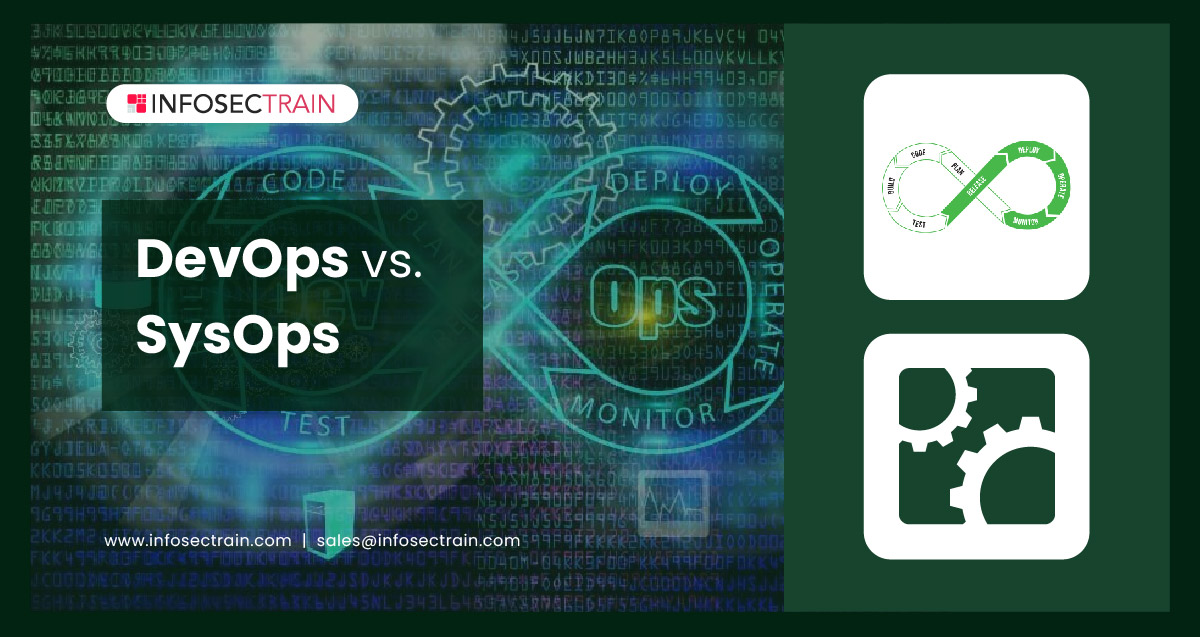DevOps Vs. SysOps
With the development of technology, cloud computing has provided excellent services to organizations. DevOps and SysOps are the buzzwords of cloud computing which is a combination of two words Development Operations (DevOps) and System Operations (SysOps), respectively. Both cloud computing approaches are high in demand, creating a lot more job opportunities with high salary packages. This comprehensive blog is to explore the difference between DevOps and SysOps.
Table of Contents
What is DevOps?
Benefits of using DevOps
DevOps Job Roles
What is SysOps?
SysOps Job Roles
Difference between DevOps and SysOps
Best Certifications for DevOps and SysOps

What is DevOps?
DevOps is a set of tools, practices, and processes that accelerates and automates the process between the development and IT team into one continuous process. It helps to enhance customer experience and business value by services at the next level. DevOps focuses on the seven phases: Development, Integration, Testing, Monitoring, Feedback, Deployment, and Operations.
Benefits of using DevOps
DevOps offers several benefits to the business and operations in achieving customer satisfaction. The benefits of DevOps are as follows:
- Increases productivity for IT teams and enterprises
- Enhances quality and reliability of the applications or services
- Reduce the time of deployment and helps to release new features of the application
- Maximizes the business efficiency
- Improves the strategies for quick deliveries and replications
- Minimizes the cost of maintenance
- Enhances the collaboration between the development team and operational team
- With functional security testing and audits, DevOps is secure to implement in the development life cycle.
DevOps Job Roles
Using automated tools and techniques, DevOps has become a demanding career opportunity. Many businesses are actively hiring DevOps experts to have a hassle-free development process of an application or product. The following are some of the DevOps job roles:
- DevOps Engineer
- Build Engineer
- Data Analyst
- Product Manager
- Reliability Engineer
- Release Manager
What is SysOps?
SysOps is an approach based on the Information Technology Infrastructure Library (ITIL) model, a set of guidelines focused on IT Service Management to achieve business goals. It is a centralized approach to monitoring and managing the cloud infrastructure by implementing best practices. SysOps offers seamless services with consistent changes in the multi-user infrastructure.
SysOps Job Roles
There are numerous job opportunities for SysOps professionals across the world. Some of the job profiles are as follows:
- SysOps Engineer
- SysOps Administrator
- Solutions Engineer
- System Administrator
- SysOps Lead
- System Development Engineer
- System Architect
Difference between DevOps and SysOps
| DevOps | SysOps |
| DevOps is an approach based on the collaboration between development and operations teams using Agile methodology. | SysOps is a delivery approach based on Information Technology Infrastructure Library (ITIL). |
| It develops, manages, operates, and monitors the software application or product. | It manages, monitors, and operates the systems and cloud infrastructure. |
| DevOps uses the DevOps CI/CD pipeline and DevOps lifecycle management. | SysOps use IT service management for service delivery. |
| It improves the application performance in the infrastructure. | It improves the system performance in the infrastructure. |
| It accelerates the development process in coordination with the development and IT team. | It manages all the essential IT responsibilities in a multi-user infrastructure. |
| It is an adaptive approach that transforms complex problems into simple iterative problems. | It is a consistent approach that implements changes to the system. |
| Unpredictable changes are applied in the code and deployment of all phases. | Predictable changes are used for the infrastructure and system. |
| DevOps uses automation tools. | SysOps focuses on the behavior of the server and other devices in the system. |
| It improves the customer experience and business value with new features and services. | It improves the system process which already exists. |
Best Certifications for DevOps and SysOps
The DevOps and SysOps certification is a credential that adds value to the professional skills and expertise. The following is the list of top and well-known DevOps and SysOps certifications:
DevOps Certifications:
- Certified Kubernetes Administrator (CKA)
- AWS Certified DevOps Engineer- Professional
- MS- Azure DevOps Engineer
- Certified Kubernetes Application Developer (CKAD)
- Google- Professional Cloud DevOps Engineer
SysOps Certifications:
- AWS Certified SysOps Administrator- Associate
- CompTIA Security+
- Servicenow Certified System Administrator
- MS- Azure Administrator Associate
DevOps and SysOps are practical cloud computing approaches that manage the respective lifecycle or infrastructure. Based on the organization’s requirements, DevOps and SysOps are required to provide high-performance applications, highly scalable, quick deployment, and traffic rate predictions of an application. This article has covered the differences between DevOps and SysOps to understand cloud computing methods better.
AZ-400 Microsoft Certified: Azure DevOps Engineer Expert with InfosecTrain
InfosecTrain is the best training and consultancy provider in a wide range of Cybersecurity and Information security domains. It offers an instructor-led training program on Azure DevOps Engineer Expert. Our certified trainers help you get the skills to implement the DevOps life cycle in the development process. If you want to get more details, check out and enroll now.








 1800-843-7890 (India)
1800-843-7890 (India)